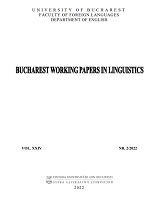An optimality-theoretic account of syllable restructuring in Early Bislama
An optimality-theoretic account of syllable restructuring in Early Bislama
Author(s): Andrei A. AvramSubject(s): Phonetics / Phonology, Historical Linguistics, 19th Century, Pre-WW I & WW I (1900 -1919), Interwar Period (1920 - 1939)
Published by: Editura Universităţii din Bucureşti
Keywords: syllable restructuring; Optimality Theory; Early Bislama; onset clusters; coda clusters;
Summary/Abstract: The paper looks at syllable restructuring in Early Bislama. The analysis is couched in the framework of Optimality Theory. The empirical evidence considered is from a corpus of pre-World War II records of Early Bislama, covering a period ranging from 1867 to 1935. It is shown that Early Bislama tends to disallow complex syllable margins and employs mostly vowel epenthesis and, to a lesser extent, consonant deletion as repair strategies for the resolution of etymological onset and coda clusters. Also discussed are the quality of the epenthetic vowels (minimally marked vs. contextually coloured), and the relevance of Early Bislama to the transformations undergone by otherwise stable features of English syllable structure.
Journal: Bucharest Working Papers in Linguistics
- Issue Year: XXIV/2022
- Issue No: 2
- Page Range: 59-79
- Page Count: 21
- Language: English

